27 October – 1 November 2024 (TADJOURAH, Djibouti): In a proactive initiative to address the gendered impacts of climate change, the Intergovernmental Authority on Development (IGAD) has launched a two-year project, “Enhancing Gender Equality in Access to Land Resources for Transformative Climate Change Adaptation in the IGAD Region.” Funded by the Africa Climate Change Fund (ACCF) of the African Development Bank, this initiative aims to empower women in Djibouti, Kenya, and Uganda by improving their access to land and natural resources for climate resilience.
Focusing on capacity building, this project aims to equip women with the essential skills and knowledge for effective climate adaptation and land governance. By creating safe spaces, the initiative encourages women, especially those who are acutely vulnerable, to understand their rights and actively participate in land reform and leadership processes. Empowering women to take on leadership roles in these areas is crucial for ensuring that their needs and voices are fully integrated into land administration reforms.
The programme’s opening was led by Mr Daher Elmi Houssein, Director of the Agriculture and Environment Division at IGAD, who emphasised that, “Land governance is deeply intertwined with cultural realities. Our goal here in Tadjourah is not only to provide training but to listen and learn from local traditions and methods of land policy and allocation.”Houssein noted that understanding community approaches to gender issues and land management would enable IGAD to incorporate best practices into the broader regional framework.
In his opening remarks, Mr Mohamed Houmed Abass, Prefect of the Tadjourah region, welcomed the attendees and stressed that, “Each country, community, and tribe has unique methods for managing and allocating land to women. It’s essential that we review past efforts, like the pastoral code and socio-economic analyses, to build on our knowledge.”
As the project unfolds, IGAD underscores the necessity of a gender-sensitive approach to climate adaptation. “Addressing climate change through a gender lens is not merely an issue of equity; it’s essential for effective climate action,” a representative said. Women’s experiences and knowledge are instrumental in crafting successful adaptation strategies. By investing in women’s empowerment and ensuring their inclusion in climate decision-making, IGAD aims to harness their potential to foster sustainable development and climate resilience across the region.
In closing, IGAD highlighted that “a just climate transition is only achievable if gender perspectives are integrated into all aspects of climate policy and practice.” This project represents a vital step in this direction, underscoring the importance of inclusive approaches that recognise and amplify women’s voices in climate action. Addressing the root causes of gender inequality will not only benefit women but also strengthen resilience across communities, building a sustainable future for all.

